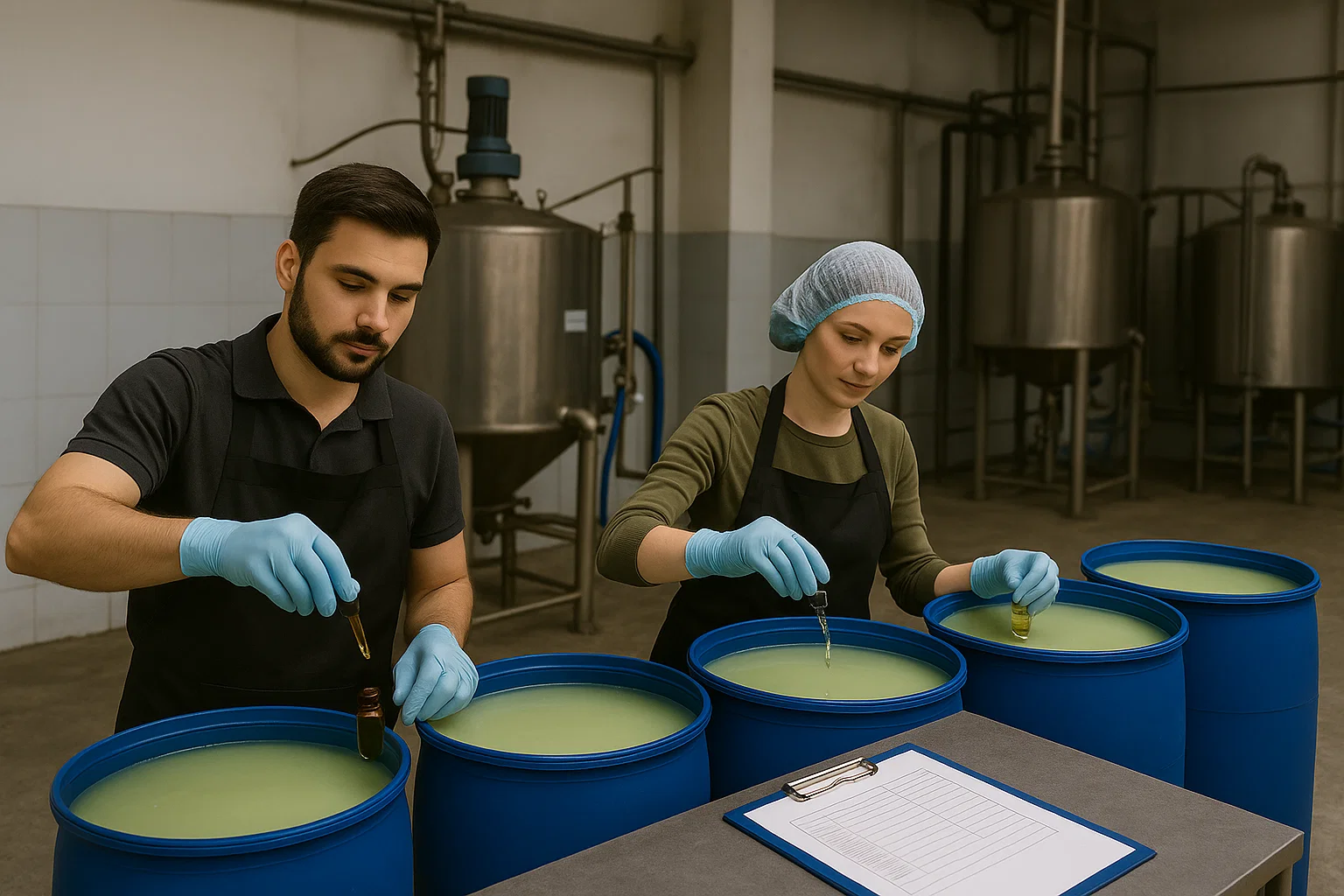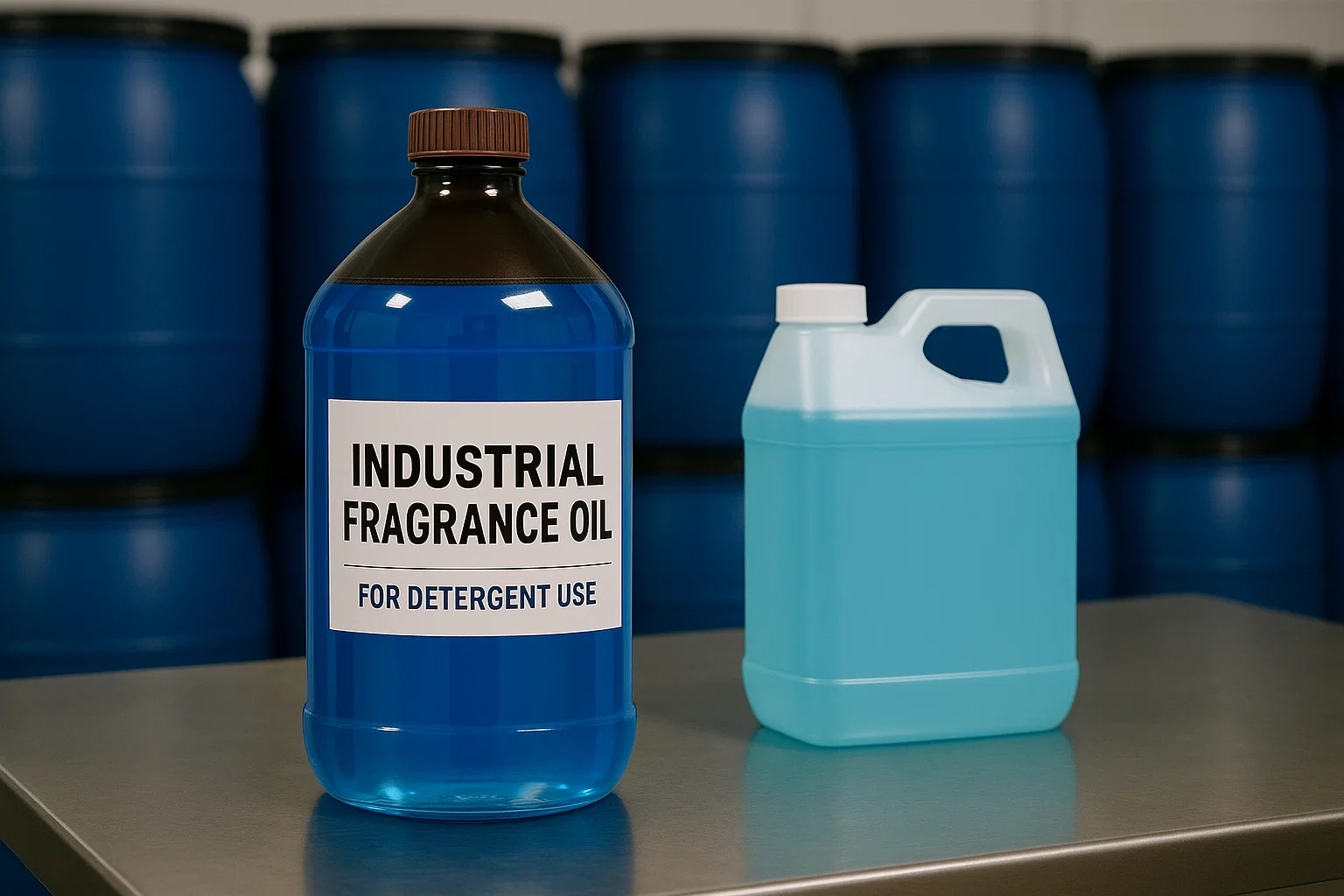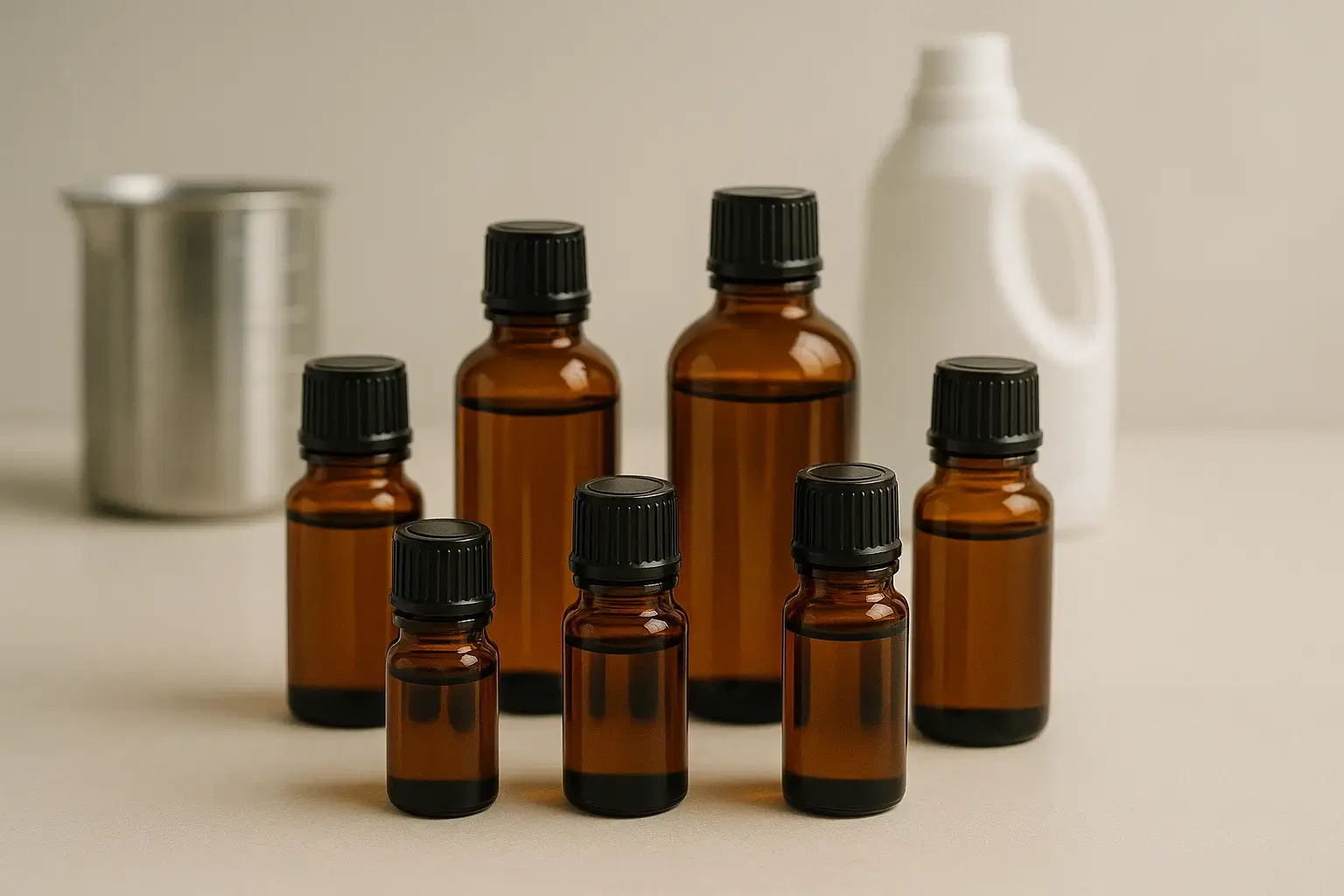In the laundry soap industry, the focus is no longer just on cleaning performance—it’s also about the lasting fragrance that remains after washing. Today’s consumer expects not only a clean result, but also a refreshing and consistent scent that enhances the overall experience. That’s why the use of essential oils for laundry soap production has become a key component in modern manufacturing lines.
Whether you're producing liquid soap, powder, or gel, choosing the right essential oil helps create a product with a distinct aromatic identity that customers recognize and remember. In an increasingly competitive market, these sensory details can make all the difference.
In this article, we explore the importance of essential oils in laundry soap, the ideal specifications for industrial use, and how to integrate them into your production process while avoiding common mistakes.
Why Use Essential Oils in Laundry Soap?
Essential oils are not just an extra touch—they’re a core component that shapes the overall user experience. When a customer opens a package or removes clean laundry from the machine and is greeted by a pleasant, long-lasting scent, it creates an immediate positive impression and increases brand loyalty.
Key benefits of using essential oils:
Boosting market value: A product with a unique scent is easier to market and can be sold at a higher price point.
Strengthening brand identity: A consistent and memorable fragrance helps your brand stand out in a crowded market.
Improving customer satisfaction: A fresh, appealing scent is seen by users as part of the product’s overall quality—not just a luxury.
To achieve these benefits, it’s essential to use essential oils for laundry soap that are formulated specifically for compatibility with chemical ingredients, and that can withstand the demands of production and storage.
Types of Essential Oils Suitable for Industrial Laundry Soap
Choosing the right essential oil for laundry soap directly impacts scent retention and the overall perception of the product. Not all oils are suitable for use in detergent-based formulations, as some may react with active ingredients, fade quickly, or lose their character during processing.
That’s why it’s important to select oils that have been tested in industrial settings and proven effective in real cleaning products. These oils must withstand exposure to heat, variations in pH, and blend smoothly into either liquid or powder formulations.
Common and effective oils include:
Lavender oil – Known for its calming and clean aroma, excellent for liquid soaps and fabric care.
Lemon oil – Sharp and refreshing, strongly associated with cleanliness and ideal for powder or gel detergents.
Downy or Comfort-type oils – Best for fabric softeners and premium laundry products, delivering a soft and luxurious scent.
Apple or peach oil – Fruity and pleasant, popular in family-focused laundry products.
Each oil delivers a unique aromatic tone, which can help manufacturers segment products by target audience or sub-brand. However, more important than the type is ensuring the oil is specifically formulated for use in industrial laundry soap production—not cosmetic-grade or unrefined fragrances.
Key Characteristics of Essential Oils Used in Production Lines
In laundry soap manufacturing, essential oils aren’t just a fragrance—they must meet strict technical requirements to function properly within the formula and remain stable until the end user receives the product. Choosing the wrong oil can affect texture, cause discoloration, or lead to the scent fading quickly after packaging.
The most important properties of industrial-grade essential oils include:
Thermal stability
The oil should withstand the heat exposure during mixing or dilution stages without evaporating or breaking down its aromatic components.
Chemical compatibility
It should not react negatively with alkaline agents, bleach, or other actives in the soap formula. The fragrance should remain consistent.
Good solubility or emulsifiability
In both powder and liquid formats, the oil must mix evenly and not cause cloudiness, separation, or sediment.
Balanced concentration
The oil should be potent enough to last after washing, but not so strong that it causes irritation or raises production costs.
Safe for use and certified
Oils should come with safety data and certifications for industrial applications, ensuring they are free from allergens or irritants, especially for products that come into contact with skin or fabric.
By choosing oils that meet these standards, manufacturers ensure that essential oils are not just an aromatic layer, but a stable, reliable, and commercially valuable ingredient in their laundry soap formulas.
Best Practices for Integrating Essential Oils into Production Lines
Integrating essential oils for laundry soap into a production line requires precision. Mistakes in timing, dosage, or mixing methods can lead to weak scent performance, instability, or separation in the final product. To ensure consistent results and high-quality output, manufacturers should follow structured, industry-tested procedures.
Key integration steps:
Add oils during the final stage
Oils should be added only after the product has cooled and the main formulation has stabilized. This protects the fragrance from thermal degradation.
Adjust concentration based on product type
For liquid soap: 0.5%–1% is typically sufficient.
For powder soap: slightly higher concentrations may be needed due to dilution during washing.
For gel: ensure fragrance does not affect viscosity or clarity.
Use closed or slow-speed mixers
High-speed or open mixing can cause excessive volatilization of the oils, reducing the overall scent intensity in the finished product.
Test in small batches first
Always conduct small-scale trials and monitor the product over 24–48 hours—and after packaging—to check for separation, discoloration, or scent fading.
Ensure compatibility with all formula components
Some oils may interact with enzymes, whitening agents, or surfactants. Compatibility testing is essential to avoid unwanted reactions.
When done correctly, the fragrance will not only be pleasant and long-lasting—it will be integrated seamlessly into the product, giving the brand a clear edge in the market.
Tips for Using Essential Oils Effectively in Soap Formulas
While essential oils can significantly elevate the sensory value of a laundry soap product, their effectiveness depends on proper handling and application. Even high-quality oils can underperform if used incorrectly—wasting resources and weakening the product’s market appeal.
Key tips for efficient usage:
Start with the lowest effective concentration
Begin testing at around 0.5%, then increase gradually if necessary. Overloading the formula can strain costs without improving performance.
Use oils specifically made for detergent production
Avoid cosmetic or perfumery-grade oils that aren’t tested for stability in alkaline or bleach-based formulas. Always verify suitability for industrial applications.
Avoid mixing multiple oils without testing
Combining two or more scents without trial runs can lead to clashing notes or unexpected interactions. Always test combinations on a sample scale.
Store oils properly
Keep essential oils in sealed, dark containers, stored in cool, dry areas to prevent degradation or evaporation.
Monitor long-term stability
Run shelf-life tests to ensure the fragrance remains consistent over time—especially for products stored in high-humidity or high-temperature conditions.
By following these best practices, manufacturers can maximize the effectiveness of essential oils for laundry soap, achieving a stable, pleasant, and market-ready result.
Common Mistakes to Avoid When Using Essential Oils
Despite the clear benefits of using essential oils for laundry soap, improper usage can result in technical issues or reduced product quality. Many manufacturers fall into avoidable traps that affect the product’s stability, appearance, or fragrance retention.
Most common mistakes include:
Adding oils at high temperatures
Essential oils are sensitive to heat. If added during the heating or boiling phase, the scent may evaporate or degrade before reaching the final product.
Using non-detergent-grade oils
Oils not designed for industrial cleaning products—such as those for cosmetics—may cause cloudiness, separation, or unpleasant changes in fragrance when mixed with cleaning agents.
Skipping long-term scent testing
A product might smell great on day one but lose most of its aroma within a week or two. Conducting post-packaging and shelf-life tests is essential.
Overdosing the formula
Adding too much essential oil doesn’t always improve fragrance. It can cause skin irritation, destabilize the formula, or lead to unnecessary production costs.
Inconsistency between batches
Switching oils or suppliers from batch to batch can create variations in scent, which may confuse customers or harm brand trust.
Avoiding these mistakes ensures the fragrance becomes a reliable strength of your product—not a risk factor or quality concern.
Do Essential Oils Affect Cleaning Performance?
One of the most common concerns among production teams is whether adding essential oils for laundry soap might weaken the cleaning power of the final product.
The short answer is: No—if applied correctly.
Essential oils are not active cleaning agents; their role is to provide a distinctive and long-lasting scent. When used in the right concentration and at the appropriate stage of the production process, they do not interfere with surfactants, enzymes, or other cleaning ingredients.
However, to ensure safety and consistency:
Always choose oils that are formulated for industrial detergent use.
Stick to recommended concentrations—usually between 0.5% and 1% depending on product type.
Add oils after the high-heat processing stage to preserve their structure and aroma.
Conduct tests to ensure long-term fragrance stability without affecting the product’s physical performance.
In summary, essential oils can be a valuable asset to your formula, enhancing the product's appeal without compromising its primary function—cleaning. When used with care and precision, they become a competitive advantage rather than a risk.
In the laundry soap industry, a successful product is not just one that cleans well—but one that leaves a memorable, lasting fragrance. A pleasant scent has become a key factor in consumer satisfaction and product loyalty. This is exactly where essential oils for laundry soap play a powerful role.
When used professionally and strategically, essential oils are more than a fragrance—they’re a brand-defining element that boosts your product’s identity and value in a competitive market.
But success with essential oils doesn’t happen by chance. It requires careful selection, compatibility testing, and proper integration into your production line. Whether you’re manufacturing liquid soap, powder, or gel, getting the fragrance right can be the difference between an ordinary product and a category leader.
Start with one oil. Test it. Evaluate the results.
From there, build a consistent scent profile that makes your brand recognizable from the first wash—and unforgettable from the first scent.
Because in today’s detergent market, fragrance isn’t optional. It’s your product’s signature.





